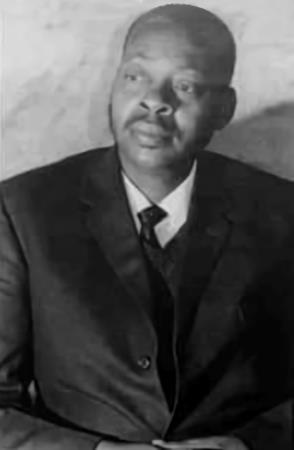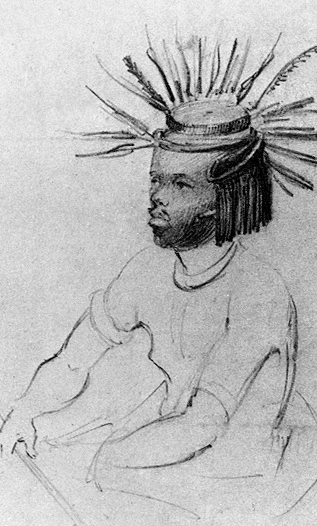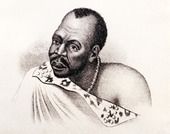Related Research Articles

Cyprian Bhekuzulu Nyangayezizwe kaSolomon was the king of the Zulu nation from 1948 until his death at Nongoma in 1968. He succeeded his father, king Solomon kaDinuzulu, after a lengthy succession dispute which was only resolved in 1944. His uncle, Arthur Mshiyeni kaDinuzulu, functioned as regent during the succession dispute and Cyprian's minority. There was conflict between Bhekuzulu and Zacharia M. Zulu on who is going to be king, Bhekuzulu(younger) was chosen, living Zacharia(older) to leave and separately start a new family at Mtubatuba with his wife Phumzile and 7 children.
A paramount chief is the English-language designation for a King/Queen or the highest-level political leader in a regional or local polity or country administered politically with a chief-based system. This term is used occasionally in anthropological and archaeological theory to refer to the rulers of multiple chiefdoms or the rulers of exceptionally powerful chiefdoms that have subordinated others. Paramount chiefs were identified by English-speakers as existing in Native American confederacies and regional chiefdoms, such as the Powhatan Confederacy and Piscataway Native Americans encountered by European colonists in the Chesapeake Bay region of North America.

The Mpondo People, or simply Ama-Mpondo, is a kingdom in what is now the Eastern Cape. It was established in 1226. The Ama-Mpondo Nation were first ruled by its founder who was King Mpondo kaNjanya who lived around and later the 'Ama-Nyawuza'clan, by nationality referred to themselves as 'Ama-Mpondo'. They are related to other Aba-Mbo kingdoms and chiefdoms in South Africa.

Hintsa ka Khawuta, also known as Great or King Hintsa, was the king of the Xhosa Kingdom, founded by his ancestor,King Tshawe. He ruled from 1820 until his death in 1835. The Xhosa Kingdom, at its peak, during his reign stretched from Mbhashe River, south of Mthatha, to the Gamtoos River, in the Southern Cape.
King Zwelonke kaXolilizwe was a South African royal and King of the Xhosa people. He became king on 1 January 2006. Zwelonke was born at Nqadu Great Palace in Willowvale in the Eastern Cape to Xolilizwe Mzikayise Sigcawu and Nozamile.

The Nguni people are a linguistic cultural group of Bantu cattle herders who migrated from central Africa into Southern Africa, made up of ethnic groups formed from hunter-gatherer pygmy and proto-agrarians, with offshoots in neighboring colonially-created countries in Southern Africa. Swazi people live in both South Africa and Eswatini, while Ndebele people live in both South Africa and Zimbabwe.
The Rharhabe House is the second senior house of the Xhosa Kingdom. Its royal palace is in the former Ciskei and its counterpart in the former Transkei is the Gcaleka, which is the great house of Phalo.

The Gcaleka House is the Great house of the Xhosa Kingdom in what is now the Eastern Cape. Its royal palace is in the former Transkei and its counterpart in the former Ciskei is the Rharhabe, which is the right hand house of Phalo.

Qumbu is a town in OR Tambo District Municipality in the Eastern Cape province of South Africa.

King Madzikane was the founder and a King of the amaBhaca nation. He was the son of the Zelemu King Khalimeshe kaWabana.
The AmaNdlambe or the Ndlambe is a Xhosa principality located in the Eastern Cape, South Africa. Founded by Prince Ndlambe, son of King Rharhabe and grandson of King Phalo, Ndlambe's advisors and strong army were known as the 'AmaNdlambe'. Prince Ndlambe was also the uncle of King Hintsa.
The Imidushane clan was founded by one of the greatest Xhosa warriors Prince Mdushane who was the eldest son of Prince Ndlambe, the son of King Rharhabe.
Queen (iKumkanikazi) Noloyiso Sandile was a South African Royal.
Kumkani (King) Jonguxolo Sandile "Aa! Vul'ulwandle!" is the King and ruler of the Rharhabe House of the Xhosa Kingdom.

The Mpondomise people, also called Ama-Mpondomise, are a Xhosa-speaking people. Their traditional homeland has been in the contemporary era Eastern Cape province of South Africa, during apartheid they were located both in the Ciskei and Transkei region. Like other separate Xhosa-speaking kingdoms such as Aba-Thembu and Ama-Mpondo, they speak Xhosa and are at times considered as part of the Xhosa people.
Queen Mamani kaPhahlo (1702-1758) was a queen of the AmaMpondomise Kingdom from 1732 to 1758, following after her father, King Phahlo. She is also known as Queen Mbingwa. As the eldest among three daughters of the Great Wife of King Phahlo, she successfully challenged her half-brothers from the smaller houses for the throne upon the death of her father. She married Princess Ntsibatha, a Mpondo princess, she died in May 1758 without any heirs to the throne. She was succeeded by one of her brothers, King Sonthlo, who she installed in her position despite challenges from Within the royal family members at that time
References
- ↑ Dispatch. "High court dismisses Dosini bid to appeal Pahlo royal crown".
- ↑ Legal Brief. "AmaMpondomise kingship must be reinstated – ruling". Legalbrief.
- ↑ Dispatch. "High court dismisses Dosini bid to appeal Pahlo royal crown".
- ↑ Dispatch. "High court dismisses Dosini bid to appeal Pahlo royal crown".